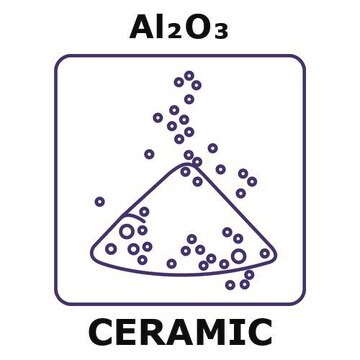702129
Aluminum oxide
nanoparticles, <50 nm particle size (DLS), 20 wt. % in isopropanol
Sinónimos:
Alumina
About This Item
Productos recomendados
formulario
dispersion
nanoparticles
concentración
20 wt. % in isopropanol
tamaño de partícula
<50 nm (DLS)
pH
8-10
densidad
0.79 g/cm3 at 25 °C
cadena SMILES
O=[Al]O[Al]=O
InChI
1S/2Al.3O
Clave InChI
TWNQGVIAIRXVLR-UHFFFAOYSA-N
¿Está buscando productos similares? Visita Guía de comparación de productos
Descripción general
Aplicación
- Elemental analysis of levitated solid samples by microwave-assisted laser induced breakdown spectroscopy.: This study explores the application of aluminium oxide in enhancing the elemental analysis capabilities of laser induced breakdown spectroscopy, providing a novel approach for high precision chemical analysis in analytical chemistry (Alamri AM et al., 2024).
- An ab initio molecular dynamics investigation of the behaviour of amorphous substances in anodic aluminium oxide under electric field.: This research presents a molecular-level understanding of how amorphous substances behave within anodic aluminium oxide structures when subjected to an electric field, offering insights into the material′s stability and reactivity (An Z et al., 2024).
- Alternative nano-lithographic tools for shell-isolated nanoparticle enhanced Raman spectroscopy substrates.: The article discusses the utilization of aluminium oxide in the development of advanced nano-lithographic tools, significantly enhancing the performance of Raman spectroscopy for chemical detection and analysis (Srivastava K et al., 2024).
- Unexpected early loosening of rectangular straight femoral Zweymüller stems with an alumina-reduced surface after total hip arthroplasty-a prospective, double-blind, randomized controlled trial.: This study examines the clinical implications of using aluminium oxide in prosthetic implants, specifically its effect on the longevity and stability of femoral stems in hip arthroplasty (Moret CS et al., 2024).
- Green Synthesis of Aluminum Oxide Nanoparticles Using Clerodendrum phlomidis and Their Antibacterial, Anti-inflammatory, and Antioxidant Activities.: Investigates the biogenic synthesis of aluminium oxide nanoparticles, highlighting their potential in biomedical applications due to their antibacterial, anti-inflammatory, and antioxidant properties (Thanaraj S et al., 2024).
Palabra de señalización
Danger
Frases de peligro
Consejos de prudencia
Clasificaciones de peligro
Eye Irrit. 2 - Flam. Liq. 2 - STOT SE 3
Órganos de actuación
Central nervous system
Código de clase de almacenamiento
3 - Flammable liquids
Clase de riesgo para el agua (WGK)
WGK 1
Punto de inflamabilidad (°F)
53.6 °F - closed cup
Punto de inflamabilidad (°C)
12 °C - closed cup
Equipo de protección personal
Eyeshields, Faceshields, Gloves, type ABEK (EN14387) respirator filter
Certificados de análisis (COA)
Busque Certificados de análisis (COA) introduciendo el número de lote del producto. Los números de lote se encuentran en la etiqueta del producto después de las palabras «Lot» o «Batch»
¿Ya tiene este producto?
Encuentre la documentación para los productos que ha comprado recientemente en la Biblioteca de documentos.
Los clientes también vieron
Artículos
Hydrogen is one of the most important resources in providing food, fuel, and chemical products for our everyday life. Sustainable catalytic hydrogen production from bioethanol has gained significant attention in recent years due to globally diminishing fossil fuel supplies, which have necessitated the search for new chemical feedstocks.
Electronically, it behaves as a wide band gap (3.2 eV) semiconductor and exhibits memristor properties.2 Optically, TiO2 has high opacity with a very high refractive index3 (>2.4), and it exhibits strong absorbance in the UV range.
Advanced Inorganic Materials for Solid State Lighting
Nuestro equipo de científicos tiene experiencia en todas las áreas de investigación: Ciencias de la vida, Ciencia de los materiales, Síntesis química, Cromatografía, Analítica y muchas otras.
Póngase en contacto con el Servicio técnico





